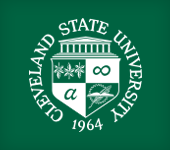About Clinical-bioanalytical Chemistry, Phd in Cleveland State University
The Ph.D. program in Clinical-Bioanalytical Chemistry is offered jointly by Cleveland State University and the Lerner Research Institute of The Cleveland Clinic. This unique program attracts students from all over the world. Clinical-Bioanalytical Chemistry applies the knowledge of chemistry and, in particular, chemical analysis to the study of the origins and diagnoses of diseases. Graduates of this Ph.D. program are employed in many clinical-bioanalytical settings. They become directors of clinical laboratories and research scientists in biomedical and biotechnology fields, in in vitro diagnostics, in reference and analytical laboratories, in academic institutions, and in many other settings. Because of the concentration of chemical, medical, and related industries and institutions in the Cleveland area, many graduates of this program have found fulfilling positions locally. Others have selected employment outside of the Cleveland area, including employment outside of the United States. Chemists with advanced degrees generally have a variety of career opportunities, and Cleveland State graduates are no exception. The program has outstanding faculty with whom students conduct their dissertation research. Students have the opportunity to do research with faculty and research scientists at Cleveland State, The Cleveland Clinic, and other medical centers. The program has fifty faculty members who have a broad range of research interests in disease mechanism and diagnosis, bioanalytical chemistry, biomedicine, and molecular biology. State-of-the-art facilities and advanced bioanalytical technologies are available to students in the program, including (but not limited to) mass spectrometry (including MALDI-TOF and LC-ESI-triple quadrupole MS, LC-ESI-ion- trap MS), HPLC, conventional and capillary electrophoresis, immunoassays, ultracentrifugation, NMR, EPR, FTIR, absorption spectroscopy, spectrofluorometry, X-ray crystallography, molecular biology techniques, and computational chemistry and chemical imaging techniques.
RESEARCH FACILITIES
The Chemistry Department is housed in the Basic Science Building and the Science and Research Center. In addition to well-equipped research laboratories, there are special function rooms, such as a cold room and several instrumental centers. Generally, graduate students occupy research space near their research advisors, which leads to frequent interaction.
Major instrumentation available in the program includes superconducting multinuclear NMR, automated X-ray diffractometer, GC-ion-trap MS, MALDITOF and LC-ESI-triple quadruple and LCESI-ion-trap mass spectrometers, capillary electrophoresis, HPLC, GCFTIR, FTIR spectrometers, UV-visible spectrophotometers, liquid scintillation counter, immunoassay instrumentation, fluorescence spectrometer, atomic absorption spectrometers, EPR, and extensive computer capabilities. Students also have ready access to the facilities and the state-of-the-art instrumentation available at the Cleveland Clinic. Several instrumental centers are located in the department and serve the research and service needs of Cleveland State faculty and students. Opportunities for graduate training in mass spectrometry are afforded through these centers.
Cleveland State University Cost of Attendance
The following is a budget estimate for international students studying in the United States for the forthcoming academic year. If you are a potential student at the institute, it is highly recommended that you keep track of the costs listed below and plan ahead of time for your stay.
| Expenses |
Bachelor’s Degree |
Master’s Degree |
Doctoral Degree |
| Tuition & Fees |
21,375 |
23,590 |
17,262 |
| Room/Board |
16,800 |
16,800 |
16,800 |
| Books & Supplies |
800 |
800 |
800 |
| Health Insurance |
3,523 |
3,523 |
3,523 |
| Transportation |
1,770 |
1,770 |
1,770 |
| Personal Expenses |
1,800 |
1,800 |
1,800 |
| Total Estimated Cost |
46,068 |
48,283 |
41,956 |
